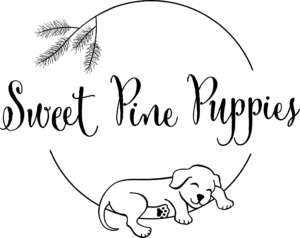We suggest the following protocol when taking your puppy home to ensure a smooth and healthy transition into their new home.
Stress, lack of sleep, new people, etc. can compromise your pup’s immune system and, unfortunately, puppy parasites can flourish. Being proactive about this can save your pup’s life.
While ALL puppies are treated on a deworming schedule, pups can leave us “clean” only to be home for a week or two and have a parasite. Please know that ALL dogs/puppies have parasites. When you deworm and/or medicate, you can kill all live/active parasites.
However, parasites and protozoa have a plan for survival in place. They lay dormant eggs in the tissues of the host. The ONLY way these eggs can be “activated” is through stress, a compromised immune system, pregnancy (hence the puppy has parasites – they are passed from mama to baby) and sickness/disease. Our job is to treat live parasites and then keep pups healthy and happy to ensure their body is not a place where dormant eggs can be activated.
Unfortunately a puppy is a preferred host. They are 80% water upon birth, grow at an incredibly fast rate and naturally have a compromised immune system. We highly recommend following your veterinarian’s recommendations on a deworming schedule.
After a lot of thought and experience, we recommend you try the following protocol to minimize the activation of dormant parasites:
- Keep the house completely calm and stress-free for three days to a week. No new visitors, limited commotion and minimal handling, will help a lot. Treat them like a newborn baby coming home. When you come home or have visitors stop by, please keep all shoes at the door. Parvo can be brought inside on the bottom of shoes, and that’s a nasty illness for little pups.
- Do not wake up a sleeping pup. Puppies can sleep an incredible amount of time, so don’t worry if it seems like a lot the first few weeks. As long as your pup wakes up with energy, eats well, drinks well and goes potty, things are all good. As they get older they will start sleeping less and playing more.
- Mushy poop is common with stress and is not unusual after the ride home and during their first few days in their new home and environment. You can add a large spoonful of canned pumpkin (not pumpkin pie filling, which can have other ingredients) for the first five days to help firm it back up. If their poop is consistently mushy you can switch them to boiled hamburger or chicken and white rice. Be careful to make sure there are no added seasonings and it is very bland. A nice bland diet is imperative during a tough transition.
As soon as the stools start to become firm, you can start SLOWLY adding kibble back into their diet. I would give it a good 5 days before fully taking them off the chicken & rice or pumpkin, just for good measure. If they get mushy again, you’ve done it too fast, so just cut it back a little for another day. You can make large batches of boiled hamburger or chicken at a time and keep it in the fridge or even freeze it prior to the puppy coming home.
- Do not feed ANY treats (including bones) while their poop is mushy. Just the diet above until it is normal again and they are fully back on kibble. You don’t want to cause an upset tummy due to food or treats, upset tummies create a nice environment for parasites.
- I also strongly recommend adding a good probiotic to their food.
When to worry:
- Poop contains mucus or blood. If this happens, feed ONLY a bland diet with no bones or treats for 24 hours. If the condition remains, call your vet for further instructions.
- Puppy is lethargic, does not play or refuses to eat. Call your vet for further instructions.
- Puppy can’t poop and vomits. This can indicate he or she ate something and has a blockage. This is an emergency. Seek immediate veterinary care.
- Liquid poop. Be careful. A puppy can dehydrate rapidly. Keep them hydrated. If poop does not improve quickly, a visit to the vet will likely be needed.
I hope this makes the transition for your puppy easier and healthier. Thank you for ensuring their safety and well-being!
